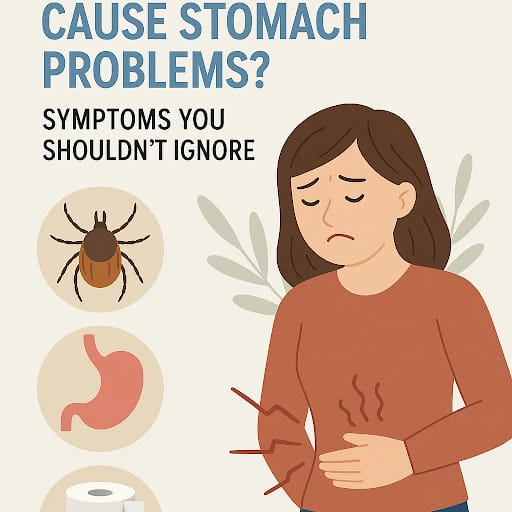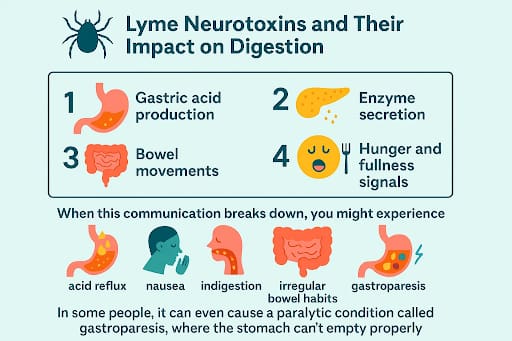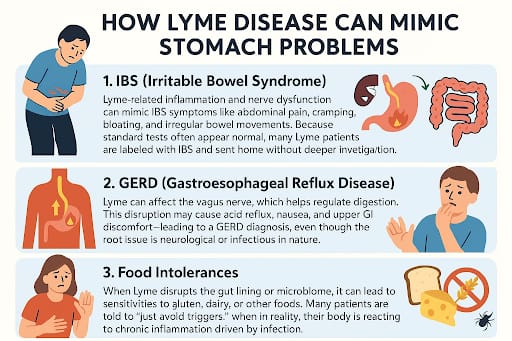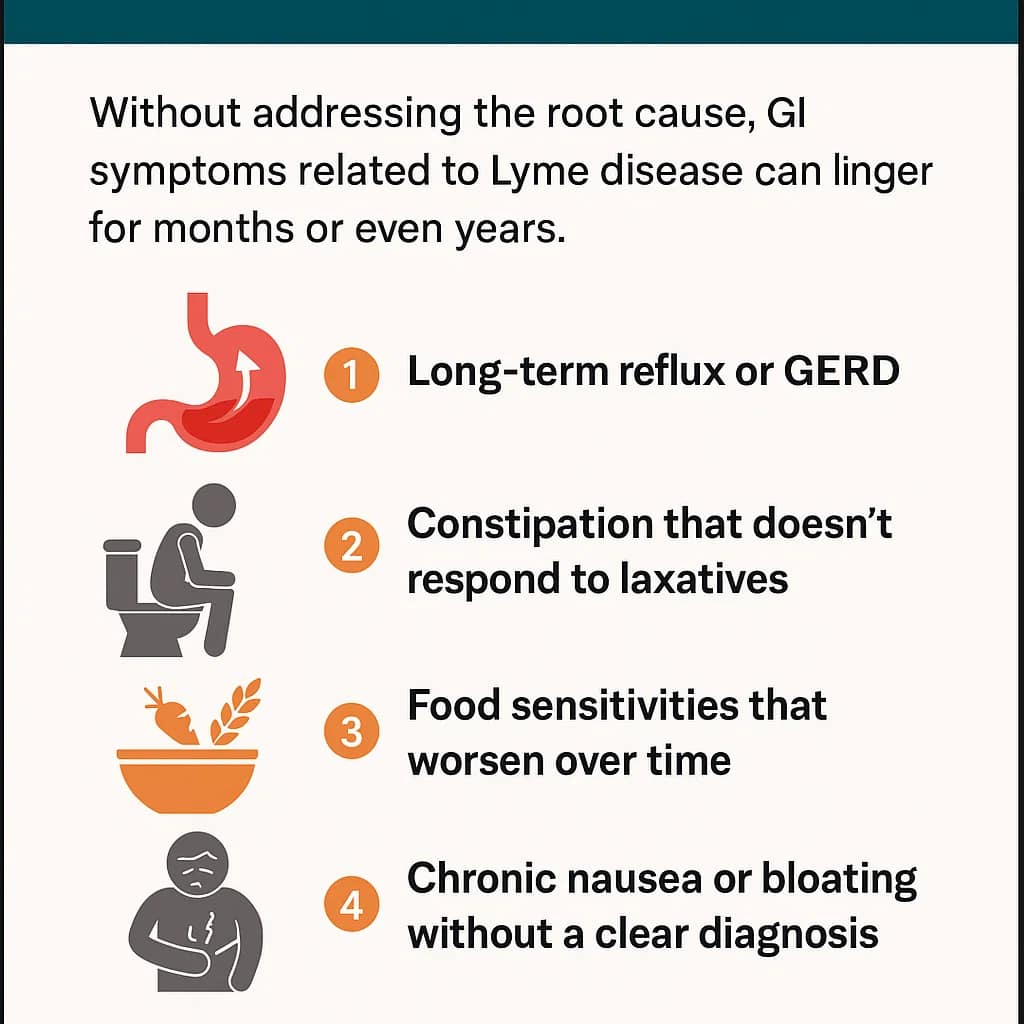
Introduction
Lyme disease is often known for the common symptoms which are joint pain, fatigue, fever, and neurological symptoms– but little did you know that in chronic or later stages of Lyme affects the digestive system.
Many individuals with Lyme report ongoing stomach issues such as bloating, nausea, acid reflux, or constipation. Yet a lot of times, these symptoms are often dismissed or misdiagnosed. Ignoring these signs delays processes of healing and might as well complicate your journey towards healing.
Let us explore the Gut- Lyme connection, common GI symptoms, and why your symptom timeline matters more than you might think.
Can Lyme disease Affect the Gut?

Lyme disease with chronic Lyme reports consistent gastrointestinal (GI) symptoms that do not respond to typical treatments.
Your gut is not just the place where digestion occurs. If your body is fighting a systemic infection like Lyme disease, this immune response can disturb gut function in several ways.
- Inflammation: Lyme illness triggers inflammation throughout the body. So the lining of the intestine also is in an inflammatory condition. This leads to symptoms such as gas, discomfort, bloating, and so on.
- Immune disruption: Lyme causes the immune system to also disrupt the healthy tissues, too.
- Microbiome disturbance: The infection and antibiotics that are used to treat Lyme disease disturb your gut flora, playing a key role in digestion and absorption of nutrients.
The gut or gastrointestinal tract is affected and causes delayed gastric emptying, motility changes, and food sensitivities. This leads to issues such as Irritable Bowel Syndrome (IBS) or Inflammatory Bowel Disease (IBD), which can also lead to misdiagnosis.
Stomach and Digestive Symptoms Linked to Lyme disease

Lyme disease triggers a variety of stomach and digestive issues, mostly in chronic and later stages of infections. These symptoms are persistent and sporadic in nature. Many cases are reported where there is misdiagnosis as IBS, GERD, or food intolerances.
- Nausea and Vomiting
- Abdominal Pain or Cramping
- Bloating and Gas
- Diarrhea or Constipation
- Acid Reflux or GERD
- Appetite Loss
- Abrupt Weight Changes
What Testing Can Reveal
Targeted testing can identify infectious conditions and underlying gut imbalances. Since gut issues can come from multiple sources like food sensitivities, inflammation, bacterial overgrowth or mold toxicity.
Testing helps to give a clearer picture of what is actually going on in your body.
Key tests comprises of:
- Lyme disease Tests: ELISA and Western Blot Test, PCR, Igenex/ Vibrant Labs
- Comprehensive Stool Analysis: detects yeast, inflammation, gut bacteria, parasites, and so on.
- SIBO Breath Test: A test to measure overgrowth in the small intestine. Detects bloating, gas, constipation or diarrhea conditions.
- Food sensitivity: IgG/ IgE tests to detect allergic reactions.
- Organic Acids and Mycotoxin Tests: detect detox function, mold exposure, and gut microbial health.
In order to eliminate and give symptomatic treatment, it is necessary to identify the symptoms effectively.
Daily Habits That Can Help

Simple daily practices can support digestion and minimize Lyme- related gut symptoms.
- Enhanced Eating Schedules and Chewing Practices: Eat at regular times to support digestive rhythms. Chew slowly and thoroughly to ease the workload on your gut and improve digestion.
- Hydration and Gut Motility: Hydration is necessary when dealing with Lyme disease. One suspecting Lyme disease and stomach problems drink water throughout the day. Herbal supplements and warm lemon water will help in minimizing bloating issues and help in enhancing motility.
- Gentle movements and Abdominal Massage: Lights walk post- meals promote digestion and support bowel movement.
- Meditation: Deep and slow breathing helps to calm the nervous system and aids in gut- brain connection.
- Medications: One should consult a doctor or physician in order to combine holistic approaches with the pharmacological approach.

| Date and time of symptoms | Specific GI symptoms (e.g., nausea, pain, diarrhea, bloating) | Severity scale (e.g., 1–10) | Food and drink intake | Stress levels or emotional state | Sleep quality the night before | Any medications, antibiotics, herbs, or supplement taken | Menstrual cycle stage (if applicable) | Other Lyme-related symptoms that appeared the same day (like fatigue, brain fog, or joint pain) |
Date and time of symptoms | Specific GI symptoms (e.g., nausea, pain, diarrhea, bloating) | Severity scale (e.g., 1–10) | Food and drink intake | Stress levels or emotional state | Sleep quality the night before | Any medications, antibiotics, herbs, or supplement taken | Menstrual cycle stage (if applicable) | Other Lyme-related symptoms that appeared the same day (like fatigue, brain fog, or joint pain) |
Conclusion
- If you are experiencing consistent stomach aches that do not heal by typical treatments, it is time to dive deeper.
- Lyme disease does not just affect the physical, mental well- being but also affects the immune function. It can create havoc on your gut, too.
- Pay attention to your body, track symptoms, and working with a doctor, you can uncover the root causes and find a treatment path that supports both your digestive health and overall recovery.
What’s Next for You?
Ready to explore a more complete path to recovery? Join the Lyme Support Network Community.
References
Kavanaugh, Bryan MD; Seymour, Bridget MD; Kozuch, Patricia MD. Lyme Disease Presenting with Gastroparesis and Cranial Nerve Vii Palsy: 846. American Journal of Gastroenterology 103():p S332, September 2008. Official journal of the American College of Gastroenterology | ACG
Dig Deeper – Gastrointestinal Complications of Lyme disease. Lymebasics.org. https://lymebasics.org/reference-information/gastrointestinal-complications-of-lyme-disease/
Gastrointestinal Symptoms of Lyme Disease – Project Lyme. Project Lyme. https://projectlyme.org/gastrointestinal-symptoms-of-lyme-disease/
Center, Johns Hopkins Lyme Disease Research. 2020. “Think the Lyme Disease Rash Is Always a Bullseye? THINK AGAIN!” Johns Hopkins Lyme Disease Research Center. May 7, 2020. [Johns Hopkins Lyme Disease].


